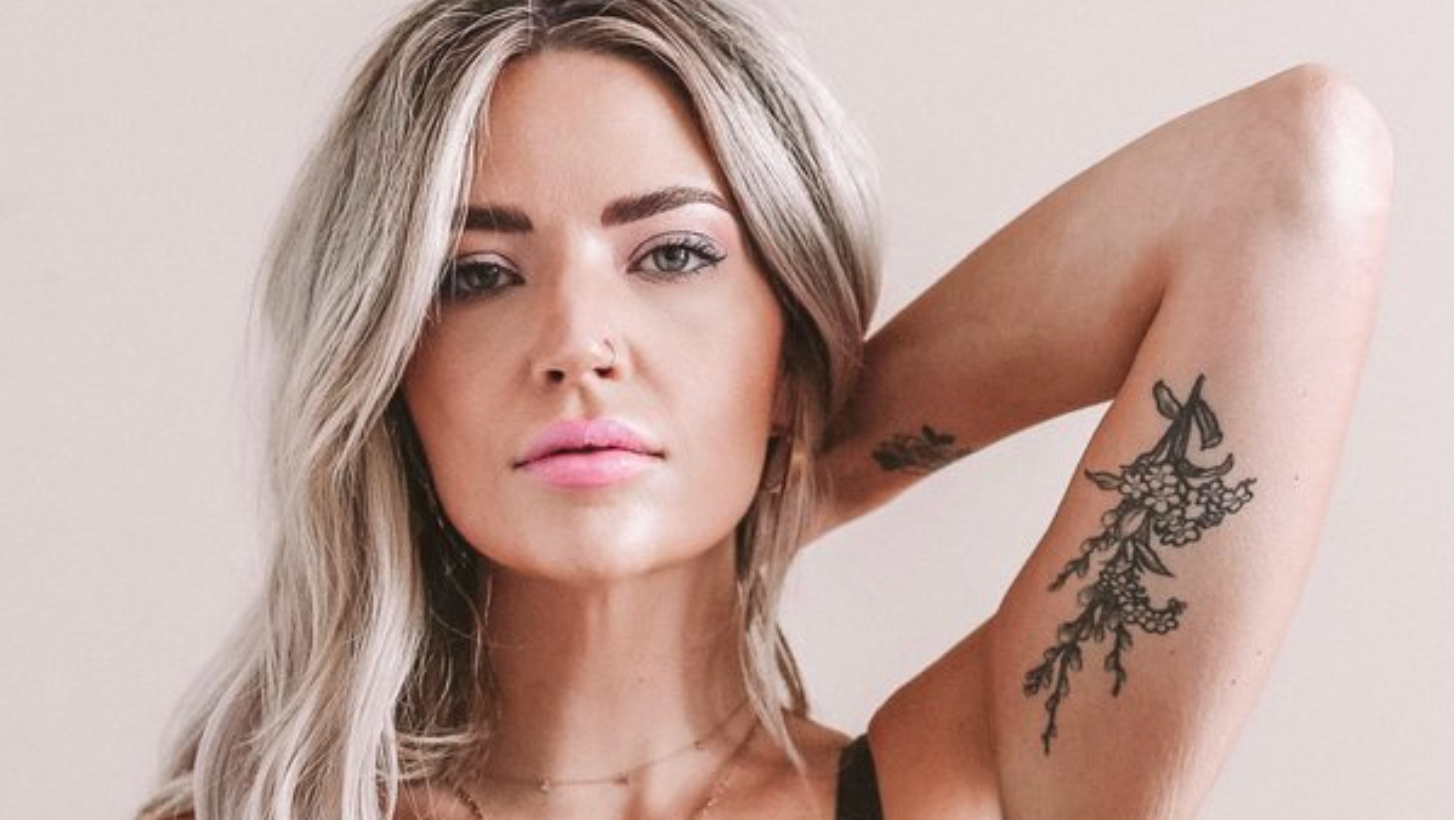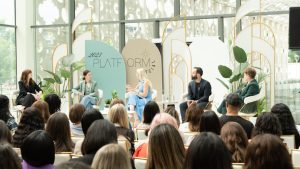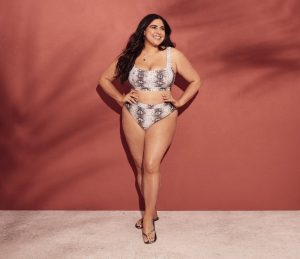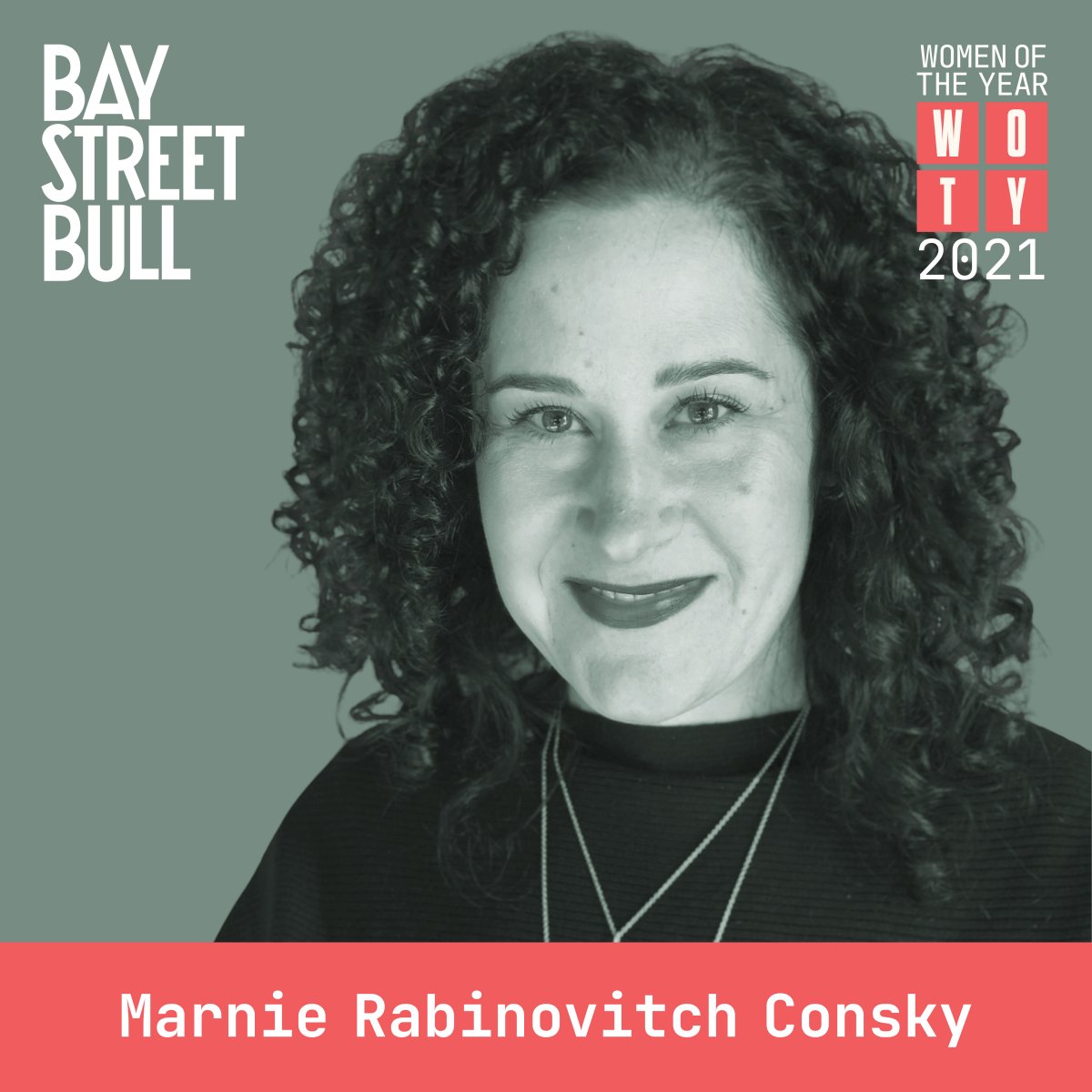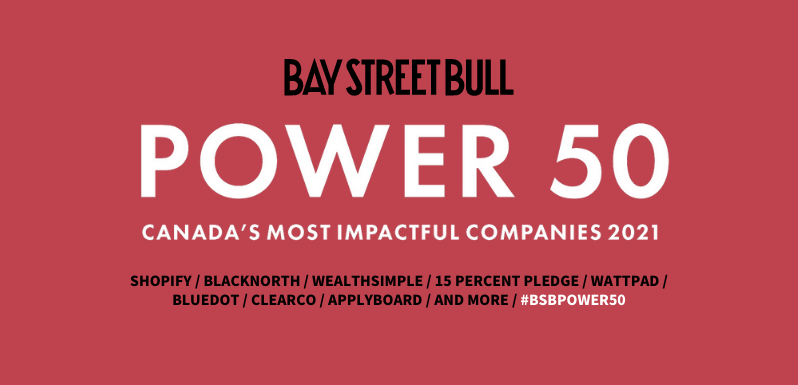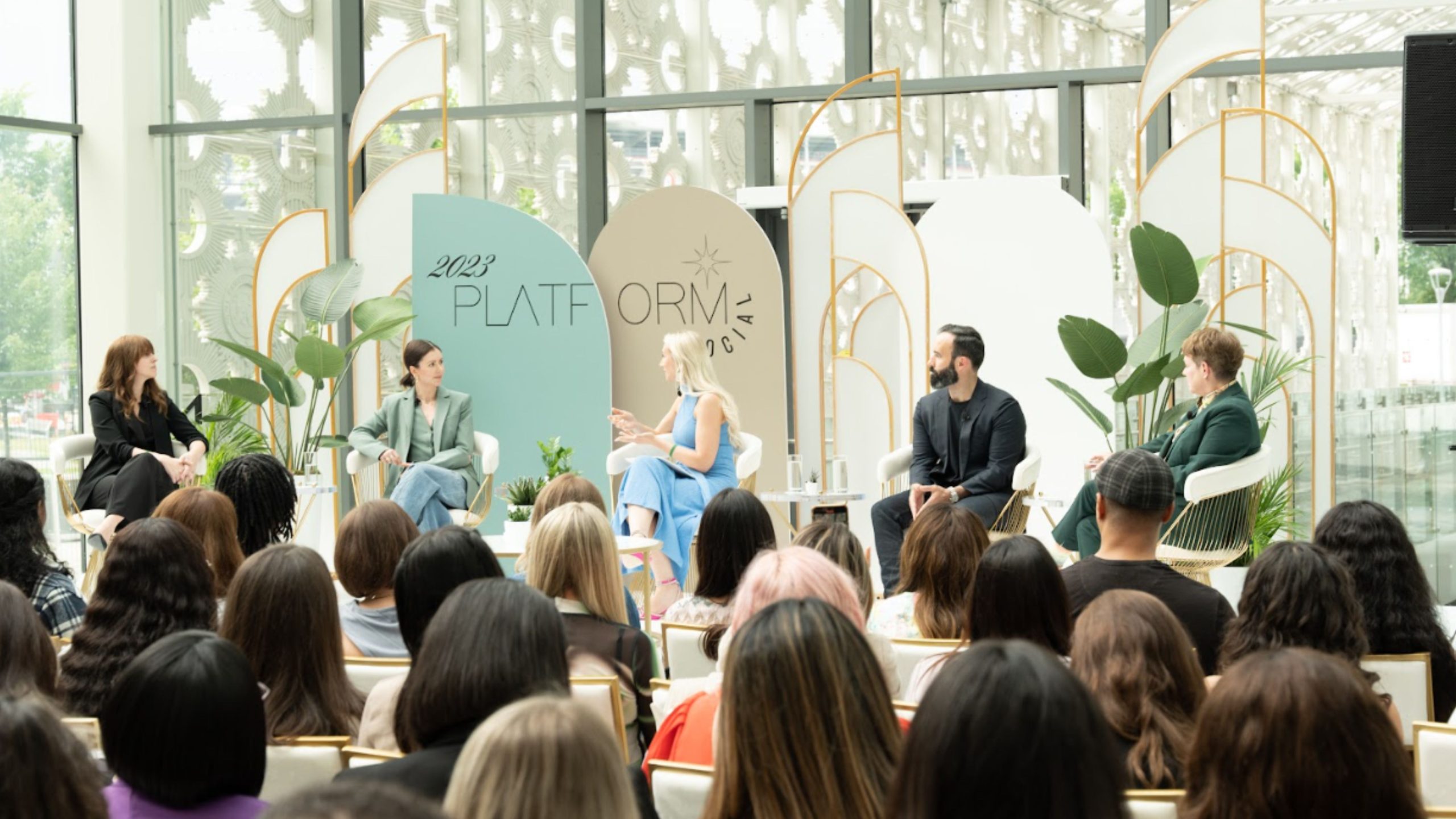Sarah Nicole Landry, better known as @thebirdspapaya online, is a champion for self-acceptance and women empowerment. Every day, she gives her community of over 1.8 million followers a glimpse at her life through what she describes as an online journal.
Through the honest and vulnerable record of her life, she manages to make everyone who follows her journey, feel like a part of it.
Twelve years ago, Landry started a blog as a way to share her stories of navigating through motherhood and all of the changes that come with it—including the changes in her body. After gaining popularity for losing weight, she began to enjoy the spotlight it brought upon her. Eventually, despite the praise, she realized she wasn’t happy.
“I actually had more anxiety around my body than I ever had before. I knew I had to get out of the cycle of posting these before and afters and feeling like I had to constantly transform my body,” said Landry. “You just get smaller and smaller and smaller—where do you go?”
In staying true to being open with her audience, she was honest about how she was feeling. While it initially lost her followers who were there for the fairytale weight loss story, she found her calling and became one of the most prominent voices in the online movement about body confidence and self-acceptance.
Today, her community is entering a new part of her journey as Landry is re-living the experience that kicked off her online presence over a decade ago. Having given birth on Jan 15. 2021 to a healthy baby girl named Lemmie, she is at a full-circle moment.
There has never been a better time for the influencer to connect with her community and celebrate the human body, and she’ll get that chance as the keynote speaker at the upcoming BodCon, presented by Knix.
“I think this is probably going to be the most vulnerable talk I’ve ever given because I’m in the most vulnerable state I’ve ever been in,” said Landry. “I just gave birth. So, I am basically everything that I’ve worked through and everything that I have talked about for years.”
As the first spotlight in our The Influencers series, Bay Street Bull spoke with Sarah Landry about rising to fame through being radically honest, building up the body confidence movement, and the changing tides of influencer marketing.
At what point did you realize that you had an audience and an influence on other people?
I came onto Instagram like anybody else would, sharing pictures of my kids and awfully filtered photos. Then, when I started losing weight, it just became something that everyone commented on. I started posting these before and afters and I got so much attention for them. So, my initial audience was really based around my weight loss story; this story of somebody who was a stay-at-home mom, who didn’t belong to a gym, who didn’t go on a program, and had lost 100 lbs. I would use buzzwords about how this was my self-love journey, and the entire time it was really not.
I was ignoring the feeling inside that perhaps this wasn’t ever going to feel like enough and there was that fear in me of what am I going to do? This can’t be my entire story. I’m so much more than this body. I actually had more anxiety around my body than I ever had before. I knew I had to get out of the cycle of posting these before and afters and feeling like I had to constantly transform my body. You just get smaller and smaller and smaller—where do you go?
I hit a wall. Everything was crumbling. My marriage had fallen apart. My whole life was changing before my eyes. And I had to face the fact that I kind of been lying to myself, which in turn, was lying to my audience. So, I started telling a different story.
I had to get really, really honest with myself and it actually caused about a year of stagnancy. I went from having a pretty strong following to people being like, “Yeah, I’m not here for this. Unfollow.” I trusted that it was the right thing to do and as I started becoming more vulnerable and more real—even though I thought I had been real before—I felt like the shame was leaving me. It was not even necessarily about the audience at that point anymore.
Then through a series of events, the core sponsor of The BodyCon, Knix, asked me to model for them. When they posted a photo of my body, it was the first time that I ever got to hear people relate to my body, without it being me that posted it. I got to see that sharing these images and these stories, brings so many of us out of the corners of society. So, it was through sharing [my story] that I got connected with so many other people and I started to feel better and more honest about myself and my own journey.
In being so open about this journey and coming to those truths, putting out content day after day, what does it look like for you to take your life and make it shareable?
When I first started doing it, this was not a movement that I was familiar with. It didn’t have the sensationalized version of it that we see now—this was years ago when it was incredibly radical. I barely had an understanding of the roots and the history of people who had done this before me. But in that journey, I started looking at my Instagram more like a journal. I stopped taking pictures and sitting there being like, “What am I going to caption it?” I really started just writing myself letters.
I started writing myself love notes and speaking in a way as if it was my journey, instead of “You need to be doing this and you need to that.” I started being really reflective about life and it wasn’t just about my body. It was about marriage. It was about love. It was about motherhood. It was about everything—we’re so multifaceted. So, the vulnerability part was in hitting “post” and that can be kind of scary. But then you realize how connected we are with so many other humans and it becomes really beautiful.
And you’ve expanded past that online journal, with brand partnerships and speaker engagements. What has it been like to create a whole career out of being open and honest and about your life?
It was exciting and scary because there was definitely a level of imposter syndrome that I experienced—a lot of it. I kept not understanding why people would want me to come and speak. Why was this so radical to share? The more I did it, the more I began to understand that there’s a lot of us who have been sitting with thoughts and feeling really cornered in life. We’re meant to be different. We’re meant to look different. We’re meant to have different experiences. We’re meant to bring our own piece of the pie to everything that we do.
It was a really cool opportunity to start to get up on stage and be able to talk and show people that I’m a real person, not just somebody sitting behind a screen. When you share so vulnerably people really connect with you and you connect with them. So when you get out from behind an ad and come into real life with people, something really transformative happens. We may have lost that a little bit in the last year, but we’re going to get it back again. We’ll get to have those conversations that carry from DMS into real life and we’ll get to hug each other.
When it comes to brands, it’s such a neat opportunity. As you grow and you get to know brands, people who support you and support your message, become the backbone of what you can do. I couldn’t do this if it weren’t for brands backing my ability to do it.
Doing these collaborations with them, and watching both of us kind of shine together by doing things collaboratively has been so cool. It’s not something that I would have envisioned at the beginning of influencer marketing. It was very much that people just want to buy a spot within your feed and now it’s much more collaborative. What can we do together? What can we create?
The body positivity movement as a whole, and the sharing of the diversity of bodies throughout marketing for companies, for example, has really become more of a norm in the last few years. As someone who was at the forefront of that conversation, what was it like seeing that movement and acceptance grow as it has?
I feel like all it did was give everybody permission to kind of show up as they are, and we’re still working through it. I think there’s a lot of mixed messaging too. When we talk about body positivity, a lot of people are like “Well, I don’t feel positive about my body when you talk about confidence.” or “I don’t feel confident in my body when you talk about self-love. I don’t love myself all the time.” So that can be really confusing. It just feels like another hurdle to get over. It feels like we already failed at not looking the part, now we can’t even feel it—and that sucks.
So, we need to be changing the conversation to being more about feeling more neutral about your body.
We have the Beauty Redefined twins coming to BodCon and they speak this all the time. Your body is an instrument, not an ornament. We are more than a body. Our sole purpose in this world is not to walk around looking like this perfect form. We’re meant to be a form that goes out and does things: enter into rooms, have conversations, bring ourselves into everything we do, go to the beach with our children and our friends, and experience those memories that we all deserve to make.
I think no matter what the movement’s doing, it’s really about educating ourselves on each other’s stories and breaking open conversations about weight and stigma about different things like poverty. There’s so much more we can expand upon, but the hope for me is that it encourages everybody to start living their lives and showing up, no matter what they look like, and understanding that their body is just a part of them, not the whole thing.
And with BodCon coming up, can you give any insights as to what you’re going to be talking about?
I think this is probably going to be the most vulnerable talk I’ve ever given because I’m in the most vulnerable state I’ve ever been in. I just gave birth. So, I am basically everything that I’ve worked through and everything that I have talked about for years. The last time I had a baby was a decade ago, and it took me eight years to accept my postpartum body. Now I’m four weeks out [of giving birth] and it’s time to get really honest about it.
I think it’s going to be a really important time to talk about the work in real-time. What is it like in the immediate minutes, moments, hours, days after giving birth? I don’t want it to take eight years again, but I don’t want this to be something that I just brush past and say, “Oh yeah, everything’s great. And I feel amazing about my body.” It’s going to be very raw and very vulnerable for me. And I am excited because they’ve actually opened it up for people to be able to submit questions. So I feel like I’ll be answering questions that truly people are curious about and nothing’s off-limits.
How does what you’re doing now compare to what your dream job was as a kid?
It’s funny because when I was about six, I really dreamed of being on a stage somewhere. I had this vision that that’s what I was going to do, but I had horrible stage fright. In my head, it had to be either an actress or a singer because those are the only things that existed back then. And it’s so funny to me when I think about that now because six-year-old me had a dream for something that didn’t even exist yet. So, in a way, I’m living out that dream, but I never would have thought that the platform was an app or that the stage was in front of women all over the world, and I never would’ve thought it would have been about my body and my confidence and about showing up and being real and living your life.
When I was in my early twenties and I started blogging, I would have never expected that the thing that I did during nap times and late at night, Googling how to code my own blog, would ever be what it is today. So, I think that there’s a certain part of all of this that still feels incredibly unbelievable. For me, I feel like the same person I’ve always been, it just is a really cool opportunity to get to do it with so many things.
For people who see your content every day versus what your every day actually is, what is an average day in the life of Sarah?
It’s funny because I really do share almost every part of my day on social, through stories. Day-to-day is chaotic and it’s not organized whatsoever. It’s different all the time, but it’s a lot of waking up and second-guessing myself. It’s brainstorming and going through meetings and managing kids and forgetting things and rushing through a quick lunch and having way too many coffees in a day [laughs].
Every day I think, “This is the day that it’s all going to fall apart. People are going to see that I’m just a fraud who doesn’t know what she’s doing,” but every day I managed to keep getting through and doing my job and doing it well enough that it keeps me getting back to doing it the next day. And I’m really proud of that. I thought that at some point it would just be this neat little package and it never is. It’s waking up and kind of getting through with grit every single day. I’ll be honest with you—I have no idea what I’m going to post tomorrow. None of my content is usually planned; it’s real-time of what’s happening.
While there are more and more accounts like yours that are vulnerable and open, on the other end of the spectrum, are accounts that are highly photoshopped or distorted realities to appear perfect 24/7. What is it like being on that one end of the spectrum and do you ever see the other kind of accounts going out of style?
I think that those things exist and we have to acknowledge that they’re there. We have to acknowledge that that’s a temptation. I have to acknowledge that I used altering apps for a really long time. And that was part of my story and part of my journey. I also have to acknowledge that I like to edit my photos for color. I like storytelling in a way that evokes emotion. So even on my stories, I like to add glitter because I want people to feel that.
I think that we have to separate color filters from editing filters from things that actually manipulate what we look like because there’s a huge part of photo editing that can be about storytelling. It’s about adding that light leak if you want it, or that flare of the sun if you want it. I actually came out with my own app because I felt like there was a gap, everything else was all about editing us.
I feel like there’s this middle ground, and we’re starting to understand it a little bit more because even with my account, I still like my feed to look a certain way. It’s something that I love to do aesthetically and creatively. We wouldn’t take a picture of our food with it all mixed up. Right? We stage it, we plate it. It makes a difference. So I try and remember that on this app, there’s the storytelling aspect of it, but make sure that the story you’re telling is an honest one. Sometimes for some of us, myself included, we have to go through the trenches of doing it all wrong before we get it right.
Do you ever feel like there will come a point where you don’t want to show your life online or where you might step back from it?
I think that for me, it’s not something I have any desire to do because I genuinely am so bonded with my community and it would feel like I lost my people, but I do acknowledge that that’s a possibility. And I think it would depend on an external factor, like changing my career or something. I think in this industry, especially because we have access to people in such an easy way [like DMing or commenting] we can create narratives with people online all day long and can cause burnout really, really quickly. So, I have to really be aware and cognizant of the fact that that’s a possibility that I could burn out at some point, but I hope not to. I’ve been doing this for 12 years and I hope to continue. I’ve really hit my stride and might be at the peak of my audience right now, but I hope that I continue to cultivate community and human connection wherever I go and whatever I do.
And speaking of community, do you have any kind of standout moment throughout those 12 years where you had feedback from your audience that meant a lot to you?
I think that’s where the public speaking part really came into play. It wasn’t about getting up on the stage and speaking. It was when you get off the stage and people are standing there with a look in their eyes that tells you that you said something that impacted them or makes them feel less alone. Because that’s how I feel when I consume other people’s content online, it makes me feel less alone. That’s why I started doing this in the first place!
I started blogging when I felt really alone in my life. So, I think it’s when you get into those moments with people where you look them in the eye and you give them a hug, you realize all of this is real. It might be on an app. It might be through pictures. It might be through stories and moments, but at the end of the day, we’re all real people. And what we’re experiencing together is very real and very special.
How did your work get impacted by COVID-19? What was it like being stuck at home while having to share your life?
All of a sudden, we were homeschooling, I was still doing my job, and all of my work had come into my space. In the beginning, I thought that everything was going to get more relaxed. What I realized was instead of being able to be like, “Oh, sorry, I can’t make that meeting, we’re in a pandemic.” It was like, “No, we’ll schedule a zoom call.”
Time doesn’t equal capacity. And I’ve had to say that over and over and over again. Because of these times being so unprecedented, it feels like we’re available 24/7 because you’re home, so you must be available. It really pushed me to understand what my capacity was and start to create my own boundaries. I started creating limits on my app time and trying to put myself to bed earlier and all of these different things.
Business-wise, it didn’t slow me down. Obviously, we had to pivot and learn a lot, but overall I think that we did it. I’m really proud of that because I think women, especially in industries like influencer marketing, are often minimized. In a time that women were losing jobs more than ever, all I could think about in the back of my head is if I keep doing this and if I keep showing up proving that this is possible, not only am I doing this for myself but maybe I can create more jobs for other women too.
I think that is a great point. I think a lot of people minimize the work that influencers have to do to create their content.
I mean, it looks really easy. I even thought it was easy! From the outside looking in, it’s like, “Wow, that is like an amazing job. You just post pictures. That must be incredible.” But, you’re missing out on the negotiations and the weeks of brand briefings and legal documents and management and creating the content to work for both sides. There’s a lot to it.
It truly is an incredible industry. And we saw how much it could help the economy this year as well because people could only go to apps for inspiration [during lockdown]. Where you engage with has an influence on what you’re going to buy that day or what outfits you think are the best to wear while working at home. You look towards trusted voices online. So, as much as it [influencer marketing] has been minimized and mocked in the past, this year proved that it was incredibly essential to our economy.
There’s so much value that influencers bring that has been overlooked.
Absolutely. I think it took something like this for people to be like, “How am I going to get the word out about my business?” It shifted into, “Okay, maybe influencers are actually onto something.”
There’s always going to be the good with the bad, so it takes people being incredibly honest with the work they do as well. I turn down more [brand partnerships] than I say yes to, and people don’t always see that. So it can be kind of disheartening when people say, “I don’t like when I see an ad on your page.” But, that’s a brand that’s supporting me! It’s a conversation that needs to keep happening because we [influencers] can make a difference and we can also make money and that shouldn’t be something that we’re ashamed to say.


